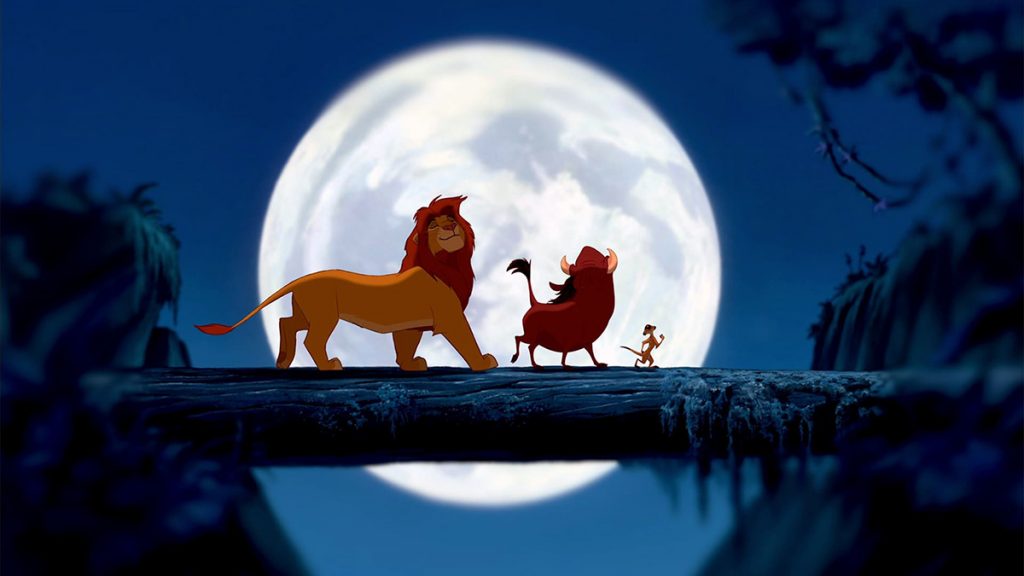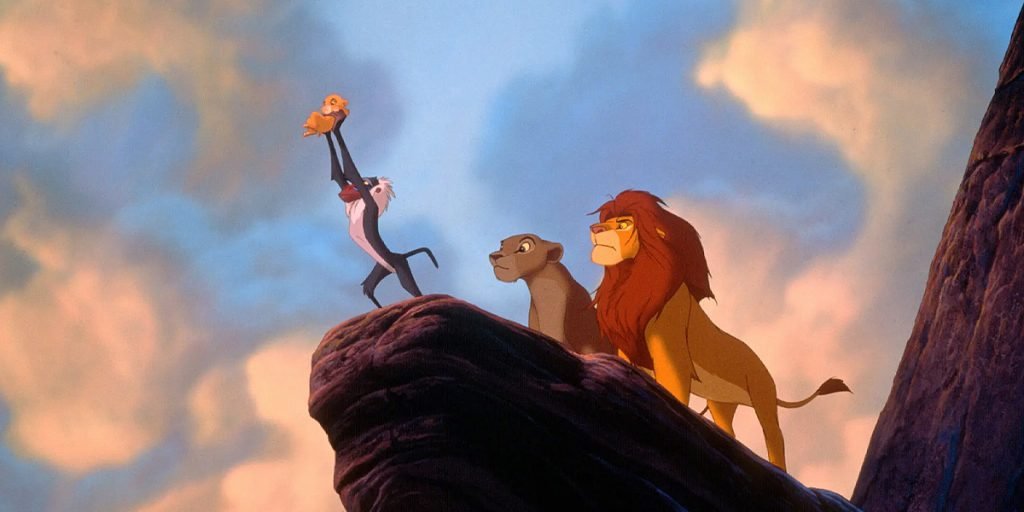A political analysis of Disney’s The Lion King (1994), a wonder of animated storytelling that thoroughly explores problematic politics and power dynamics.
Released at the the height of Disney’s creative power, in the peak of their Renaissance Era, The Lion King garnered almost universal adoration from the moment of its release, immediately became a classic of animation, and seems to grow more popular still with every passing year. The story itself, based loosely on Shakespeare’s Hamlet, tells a classic tale of heroism and cowardice, destiny and self-actualization, love and sacrifice. The animation is stunning, embedding the narrative into the film’s very imagery, allowing the visuals themselves to say so much. Paired with arguably Disney’s best soundtrack and a powerful score by Hans Zimmer, it all comes together in what is perhaps the studio’s most formally accomplished film to date. But many reviews have been written about the characters and formalities; I’m interested in taking a closer look at the politics underlying it all.
The Lion King follows Simba (Jonathan Taylor Thomas, Matthew Broderick), heir to the throne occupied by his father Mufasa (James Earl Jones), as he grows from a naive young prince into a brave, responsible leader. As a child, he roams the tundras with the sense of privilege entitled to one who knows all the land he sees will soon be under his rulership. He plays with his best friend Nala (Moira Kelly), and together they spend their days testing the limits of their agency. One day, his uncle Scar (Jeremy Irons), who has been plotting to usurp Mufasa’s throne, lures father and son into a stampede of wildebeests, where he kills Mufasa and sends Simba on the run. Simba encounters a meerkat and warthog, respectively named Timon (Nathan Lane) and Pumbaa (Ernie Sabella), and he spends some years with them forgetting about his past and learning the joys of a worry-free philosophy.
As mentioned, the film is loosely based on Shakespeare’s Hamlet, a play written several centuries ago in an antediluvian era of kings and lords, and this perhaps explains its oddly conservative themes. There is considerable emphasis on the so-called “circle of life,” a natural fixed social order that, if disrupted, will lead to chaos and violence, and this is Mufasa’s justification for the animal kingdom’s predatory nature. With a small dollop of natural juices, Simba is baptized into this feudal social order.
Here, one’s values are determined by birth, not merit or action. For those not already at the top, there is no chance of upward mobility. The essential message of the movie is “know your place.” When Rafiki (Robert Guillaume) unveils Simba and proudly displays him up on pride rock, the implication is “aww, look how cute,” but he might as well be saying, “Behold! This is the creature that will one day feast upon your carcass in accordance with the laws of the universe! Resistance is futile!” Only through subjugation are the animals able to confirm their place in the world, and thus find peace.

This entire society is a prime example of the naturalistic fallacy hard at work. The idea that just because something is automatically means it’s how it should be is the mark of a primitive, amoral civilization. The Darwinian principle of ‘survival of the fittest’ is an observation about an unfortunate fact of nature that a moral society should work on equalizing, not enforcing. Using it as a justification for natural selection is philosophically and ethically bankrupt. Looking at this society as it is, it becomes clear that, despite it being presented as a utopia, there is a foundational issue with this fundamentally pro-dynastic, pro-oligarchical system that favors the ruling class while the underclass gets literally eaten alive.
The only animal to reject this feudal society is Scar, who rebels against the natural order that labels him a weakling just because he doesn’t have the golden haunches and perky whiskers of his brother. When Scar comes into power, it becomes clear that he had recognized the imbalance promoted by the preceding reign. He is an idealist, and he promotes equality for all, lions and hyenas alike. However, despite his progressive politics, it is made unfailingly clear that Scar is the villain. His song about ushering in the New World Order features Nazi marching imagery, and seems to be an homage to Triumph of the Will, a Nazi propaganda film.
So too, the film casts him in shadows, in contrast with the bright sunlight that always seemed to accompany Mufasa. Scar’s reign is shown to turn sour; by interfering with the natural order of the food chain, a once proper utopia descends into anarchy and starvation. Much like many of the greatest evils of the twentieth century, such an abrupt and radical upheaval of the established order yields an intense shift in power rather than an equalization of it. In such a way, Scar represents a sort of Stalin-like figure, a revolutionary with selfish motives whose evil will forever be inextricably linked to an idea of progressive change that he exploited and poisoned.
However, within the film, there is not only the dogmatic unwavering natural law as the ultimate truth and all opposition as the ultimate evil – just the idea of rebellion. According to The Lion King, totalitarianism is the natural order, and rebelling against nature cannot end well. Perhaps the only way to combat social injustice is to say hakuna matata. “Hakuna matata, it means no worries.” And it really does. It’s in this section where Simba is finally free – free from his predetermined destiny, free from responsibility, free from fear and disgust, and most importantly, free from all influences on his life but his own heart. He spends his days having fun, no-stakes adventures and hanging out with like-minded friends. When Nala finds him and they fall in love all over again, it is as pure a love as can be. There are no pressures of royalty, no social conventions, just pure intimate passion. Simba chooses to go back with her to the kingdom falling apart under his uncle’s tyranny to rescue it not out of a sense of duty, but of love. And maybe that makes all the difference.
When Simba ultimately returns to fight Scar, completing his archetypal hero’s journey, it is this attitude of hakuna matata, as opposed to circle-of-life entitlement, that helps him succeed. Until now, fighting back against Scar—like Scar with Mufasa—would have been a pointless endeavor, with the only potential outcome being the selfish gain of power with no thought for actually reforming any injustices. Prior to this complete change of revolutionary impetus, attempting to combat the inherently exploitative power structure could serve no function other than enforcing it, as both working within or against the system inherently recognizes it as an inevitable truth. It’s not just that he could not have won from a place of worry and fear, but that, from that position, even winning would be a loss. Only with love and bravery can he win, and would that triumph be substantial.
Essentially, The Lion King establishes two important ideas that must work together: revolution must be forceful if necessary, and the motive must be pure. Passively accepting injustice as an unchangeable status quo—quite literally nature in the film—as everyone other than Scar does under Mufasa’s reign, is not a viable mindset, but exploiting those injustices for the selfish desire for power is worse, both ethically and in its effect on the already malfunctional society. Only with an impassioned recognition of oppression, and that moral outrage being the impetus for demanding change, can a revolution bring about positive change. Simba doesn’t want to be king, he wants to be kind, and that seems promising for the future of equality in the Pride Lands.
The Lion King (1994) is available to watch on Disney Plus.

